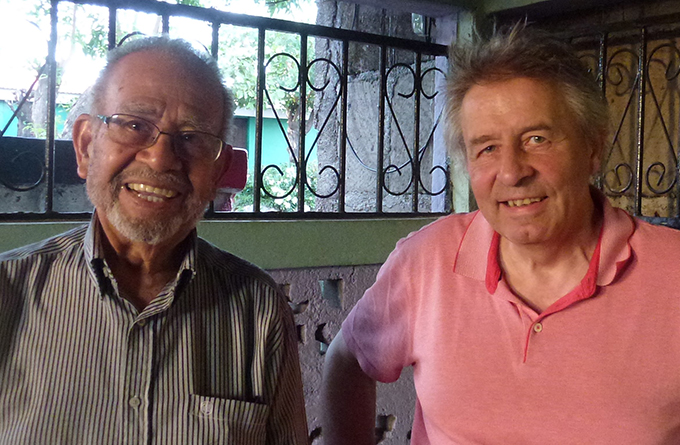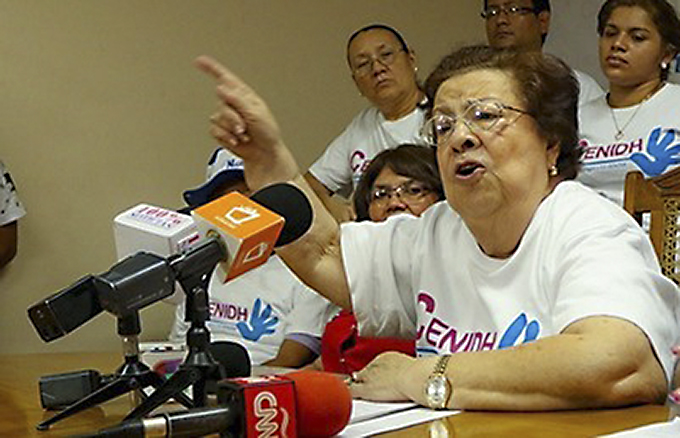Farewell to Nicaragua (4)
By Matthias Schindler
Justice and democracy need a completely new start
Onofre Guevara López
If there is one person who embodies the struggle for a free and just society in Nicaragua, it is Onofre Guevara López, who has now reached the age of 92. He is a veteran of the Nicaraguan workers’ movement and currently one of Nicaragua’s most brilliant political analysts. He grew up in the poorest conditions and began learning the craft of a shoemaker at the age of 14. Through this work he was able to get the first pair of shoes in his life. Two of his brothers died of tetanus because they did not have shoes and contracted this cruel disease by walking barefoot. He participated in the building of the first trade unions and workers’ parties in the 1940s. He joined the Communist Party, which was called PSN (Socialist Party of Nicaragua) and became editor of various left-wing newspapers. When, still during the liberation struggle against Somoza, the PSN split, he belonged to the wing that in addition to political and trade union work took up the armed struggle and later united with the FSLN. He became the editor in charge of the political opinion and discussion pages in the FSLN’s party newspaper, Barricada. After the revolution he became a member of the legislative State Council. Later, as a member of the Constituent Assembly, he participated in the drafting of Nicaragua’s new constitution. To this day he is a convinced Marxist, socialist and anti-imperialist, but he leaves no doubt that democratic principles must be guaranteed in every form of society. For this basic stance, he left the editorial board of Barricada in 1994, and later was removed as a commentator for El Nuevo Diario. Onofre is the author of various books and continues to publish his political analyses in the internet magazine Confidencial. He never attended university, but his articles are highly analytical and differentiated, and they are also always a lesson in history and political science.
Once again, in the hour of farewell, we talked about the sad state of Nicaraguan society. It has become lonely around him. The political conditions, dramatically exacerbated by the pandemic, make it almost impossible to meet with friends. He talked about his former communist comrades who have gained property and wealth through the FSLN and have now completely thrown their old ideals overboard. Without the revolution and the benefits that followed, they would never have been able to accumulate their new wealth. For this revolution two sons of Onofre gave their lives as Sandinista liberation fighters, and with the students murdered by the regime in 2018, the mourning for his two fallen sons came up with renewed vigour. Nevertheless, he will not give up and will continue the struggle for his political ideals as long as he has the power to do so. In a few days, he will publish his next article in Confidencial and once again use all his historical knowledge and argumentative persuasiveness to fight for a new democratic beginning in Nicaragua.
Vilma Núñez
Those who deal with the current political situation in Nicaragua cannot ignore Vilma Núñez. She is the president of the Nicaraguan Centre for Human Rights CENIDH, and at 83 she is an icon of human rights defence in Nicaragua. As a lawyer, she defended the political prisoners of the Sandinista Liberation Front before the courts of the Somoza dictatorship. Later, she herself was imprisoned and tortured for her support of the FSLN. During the Sandinista Revolution she was Vice-President of the Supreme Court of Justice CSJ in the 1980s. In this capacity, she also clashed several times with the powerful Comandantes de la Revolución in order to enforce trials under the rule of law, especially for former members of the Somoza National Guard. Vilma has been the president of CENIDH since 1990. Independent of the respective government – whether liberal, conservative or Sandinista – she campaigned with this organisation for the respect of the human rights in Nicaragua. She supported Ortega’s stepdaughter in her trial against her stepfather whom she accused of having sexually abused and raping her for years starting when she was a young girl. Faced with the choice of either remaining loyal to her party, the FSLN and Ortega, or defending the human rights of Ortega’s stepdaughter, Vilma Núñez opted for the human rights. She took on the legal representation of the victim and broke with the FSLN, a fundamental legal, political and personal decision that cannot be overestimated.
Since Ortega’s renewed presidency from 2007 onwards, when the undemocratic measures and dictatorial tendencies of his regime began to intensify, she has become an increasingly important voice in defence of democracy and freedom. Following the wave of state repression in 2018 and CENIDH’s strong commitment to defending the victims of this repression, the CENIDH was illegalised. Its premises were occupied by the police, and the entire institution and all documentary material were confiscated. Many months later, a health centre was opened in these premises with great ballyhoo. Some of the CENIDH staff had to flee abroad, and some her best friends avoided contact because some of their relatives held/hold well-paid positions in the state administration. But Vilma continues her work undeterred. Without an office, without the protection of a legal organisation, and only with the support of a very small circle of confidants, her messages are heard day after day in some news item through Twitter, Facebook, Zoom, or e-mail. She is one of the very few persons who, even during the revolution, clearly criticised the lack of the rule of law. Yet no-one has been more self-critical of not having been consistent enough combating the authoritarian and undemocratic tendencies within Sandinism. I feel it an extraordinary privilege to have been able to carry out some of my Nicaragua Solidarity activities together with this impressive woman. Half-jokingly she once told me she had taken a vow not to die before she could see for herself that the Ortega regime had collapsed. I sincerely hope that she can keep her promise because only then will it be possible for us to meet again.
“They express diverse and profound criticism …”
I cannot mention here all the people I met during my last trip to Nicaragua and whose fates are linked to the Sandinista Revolution and its failure. But in almost all my conversations, the same questions kept coming up at the end: How could it happen, that the once so hopeful Sandinista Revolution became the nightmare that prevails in Nicaragua today? What could and should we have done better? But in particular were all the sacrifices that we made, and what others had to suffer, justified in the light of the terrible results of this revolution? It is remarkable that with very few individual exceptions, none of the people mentioned here have fundamentally questioned the justification of the Sandinista Revolution. They express diverse and profound criticism of the most diverse institutions and episodes of this revolution. They can express this criticism with convincing expertise and authenticity because they have all personally been actively involved in these structures and processes for many years. It is to be hoped that, despite everything, their voices will continue to be heard and that they will also be noticed by the younger generation.
Vilma Núñez and Onofre Guevara embody the noblest aspects of the Sandinista Revolution like hardly anyone else. They are distinguished by their personal modesty, their absolute incorruptibility, and their intellectual quality. They are among the very few people who are not prepared to leave Nicaragua and who nevertheless express their criticism of the Ortega-Murillo dictatorship. But beyond that, the continuity, coherence, and consistency of their positions over more than half a century are testimony to their unwavering political and moral integrity. In particular, they embody two fundamental pillars that must never be forgotten when it comes to building a new society; Vilma Núñez for human rights and the rule of law, two principles of order that must always be respected, completely independent of the respective concrete form of a society. And Onofre Guevara for the inseparability of social justice and democracy because one can never be realised without the other. Despite, or perhaps because of their advanced age, they represent cutting-edge, and forward-looking positions, on these fundamental issues. If the fundamental principles they uphold could be realised in Nicaragua, and other places, a great deal would already have been achieved!
¡Adiós Nicaragüita!
One might object that the testimony presented here has no value because it is strongly subjective. Yes, this text is essentially based on my own subjective impressions and experiences in Nicaragua. But no, this does not diminish the value of its statements. They take their significance precisely because no one can dispute the personal experiences I have recounted here. All the political events mentioned here are easily verifiable and have been publicly documented many times. All the people mentioned here are currently living in Nicaragua, even if many of them for security reasons can only be mentioned with a pseudonym. One may not agree with some of my political interpretations, but no one can take away my experiences, my conversations, my joys and my disappointments.
Political circumstances did not allow me to invite all my friends, some of whom are mentioned in this report, to a joint farewell evening. Therefore, I invited my closest neighbours, who had also become very dear to me over many years, to a barbecue. They are simple people, pensioners, domestic servants, workers, clerks, a doctor, artisans and some of their family members. They all used to support the FSLN. Nowadays, they are bitterly disappointed. Only one of them went to the “election” on 7 November because he is employed in the public sector and would have risked his job if he had not participated. That evening, they represented the Nicaraguan people for me, the people to whom I have been committed since 1979. It was a very moving and very beautiful evening.
In 1969, I took part in a demonstration for the first time. It was directed against Nazism, which was gaining strength again in Germany. Then I took part in the protests against the war in Vietnam. Since then, I have been involved in trade union and civil society activities against exploitation and oppression in the world. For over forty years I was active in Nicaragua Solidarity. All the events described here are true and based solely on what I perceived with my own eyes and ears.
This text expresses how much the current situation in Nicaragua depresses me and how much I suffer from not being able to currently change these conditions. But I am only a temporary spectator. How much worse is the situation for those who live under this dictatorship every day? Who currently have relatives in prison, or who are imprisoned themselves? How must those feel who have made great personal sacrifices for the revolution and now stand before the shambles of their former dreams?
Nicaragua, Nicaragüita[1] does not exist anymore. Nor will it come back. But history goes on, a new Nicaragua will emerge. For that to happen the country will need a new political generation that can breathe new life into the concepts of freedom and justice. However, a new beginning always starts with the past from which it emerges. Analysing, and critically reflecting on one’s own history is indispensable for shaping future emancipation processes, ones better and more sustainably than have been achieved so far. If this text can make a small contribution to this, then it has already fulfilled its purpose.
¡Adiós Nicaragüita!
…
[1] “Ay Nicaragua, Nicaragüita” is the title of the most famous song of the Sandinista Revolution, written and composed by Carlos Mejía Godoy, who is currently in exile because of the political repression in his country. It is a declaration of love to Nicaragua and the Sandinista Revolution.

